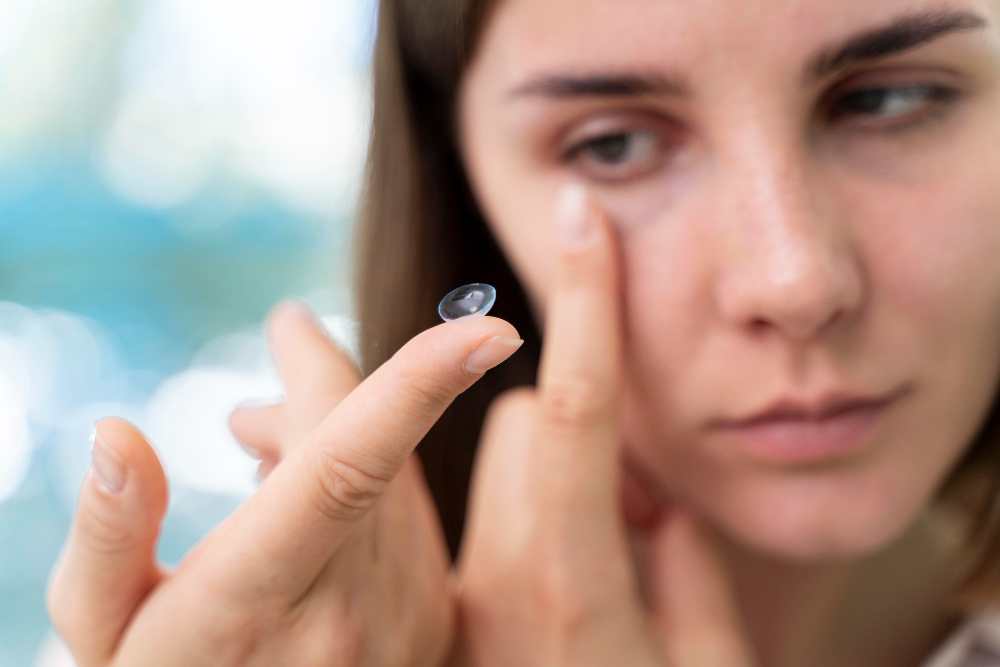
Have you ever put in a new pair of contact lenses and instantly thought, “Why are my contacts blurry?” It can be annoying, especially when you expect them to sharpen your sight, not distort it.
You might feel like your eyes are dry, your prescription is off, or something just does not feel right. Blurry vision with contacts is more common than you might think, and there are several reasons behind it.
In this guide, you will learn about the top seven causes of blurry vision with contact lenses and how to fix them. So you can go back to enjoying clear vision with confidence.
Top 7 Reasons for Blurry Contacts

Blurry vision with contact lenses can be annoying, but it is easy to fix. Below are the most common culprits behind unclear vision and what you can do about them.
1. Your Contact Lenses Are Inside-Out
One of the most common and often overlooked reasons for blurry vision with new contacts is that they might be inside out. Even brand-new lenses might be inserted the wrong way. When worn inside-out, they do not sit properly on your eye, causing discomfort and blurriness.
To check your lenses, place them on your fingertip. If the edges flare out, the lens is likely inside-out. If it forms a perfect bowl with smooth edges, it is correctly oriented.
2. Your Prescription Might Be Off
Blurry contacts might also mean that your prescription is outdated or incorrect. Vision can change over time, and using old lenses may no longer provide the clarity you need.
The American Optometric Association recommends yearly eye exams to catch vision changes early. If you are experiencing unclear vision, even with new contacts, it is worth verifying your current prescription.
3. Dry Eyes Are Interfering With Lens Clarity
If your eyes are not producing enough moisture, your lenses may not sit comfortably or function correctly. Dry eyes can cause your lenses to shift or stick, which leads to blurry vision.
According to the National Eye Institute, dry eye affects millions in the U.S. and can result from aging, screen time, medications, or environmental factors.
If your eyes feel gritty or tired, and you wonder, “why are my contacts so blurry today?” Dryness might also be the reason. Blinking more often, staying hydrated, and using preservative-free artificial tears can relieve symptoms.
4. Protein or Buildup on the Lenses
Improper cleaning or extended wear of contacts can lead to protein, oil, or environmental debris building up on the lenses. This buildup can distort vision and cause discomfort.
Reusing lenses past their recommended life span, failing to clean them properly, or storing them in old solution are key causes.
If you wear reusable lenses, follow your care routine closely. Alternatively, daily disposables help minimize buildup.
5. Wearing Contacts Too Long
This commonly searched query—”why are my contacts blurry at the end of the day”—is usually linked to overwear of the contact lenses. Contact lenses are designed to be worn for specific timeframes. Wearing them beyond those limits can reduce oxygen flow to your cornea and make your vision blurry.
According to the CDC, sleeping in contact lenses or using them for too long increases the risk of eye infections and inflammation. If your eyes feel tired or blurry toward the end of the day, it could be lens fatigue.
6. Environmental Irritants Like Allergies and Dust
Allergies, smoke, wind, and pollutants can also irritate your eyes and affect how your contact lenses function. Even indoor issues like dry air or prolonged screen exposure can make your contacts feel blurry.
Symptoms often include redness, itching, or the urge to rub your eyes. In such cases, try to identify and reduce your exposure to common triggers. Use antihistamine drops if needed (under a doctor’s guidance).
7. Adjustment Period for New Contacts
Switching to new contact lenses—especially ones for astigmatism—can take time to get used to. Some lenses need to be rotated and aligned on your eye before they work correctly.
It is normal for vision to feel a bit off during the first few hours or even a couple of days. Stay patient and follow your optometrist’s instructions.
When Should You See an Eye Care Specialist?

Blurry vision with contact lenses is often caused by minor issues like dry eyes or an inside-out lens. But sometimes, it is a sign of something more serious.
If your blurry vision does not go away, or if it’s paired with eye pain, redness, discharge, or sensitivity to light, now is the time to call an eye care professional.
Precautiously, ignoring these symptoms can lead to long-term damage or infections. An expert can determine whether the problem is your contact lenses, your prescription, or an underlying condition.
Get a Clear Vision With Texan Eye Care
If you are in Texas and struggling with blurry contact lenses, Texan Eye Care is here to help. We provide comprehensive eye exams, customized contact lens fittings, and ongoing care to ensure your vision stays clear and healthy.
Whether your issue is related to lens quality, dryness, or a prescription that no longer works, our experienced team can identify the root cause. Our services cover everything from routine checkups to advanced diagnostic testing, all tailored to your unique eye health needs.
Final Thoughts
Blurry contacts can be annoying, but the fix is often simple. From flipped lenses to dry eyes or outdated prescriptions, knowing the cause helps you take the right steps. If symptoms persist or worsen, it is best to seek expert help from a trusted medical center such as Texan Eye Care.
Don’t ignore ongoing eye issues so that you can get clear sight, which starts with the right care.
